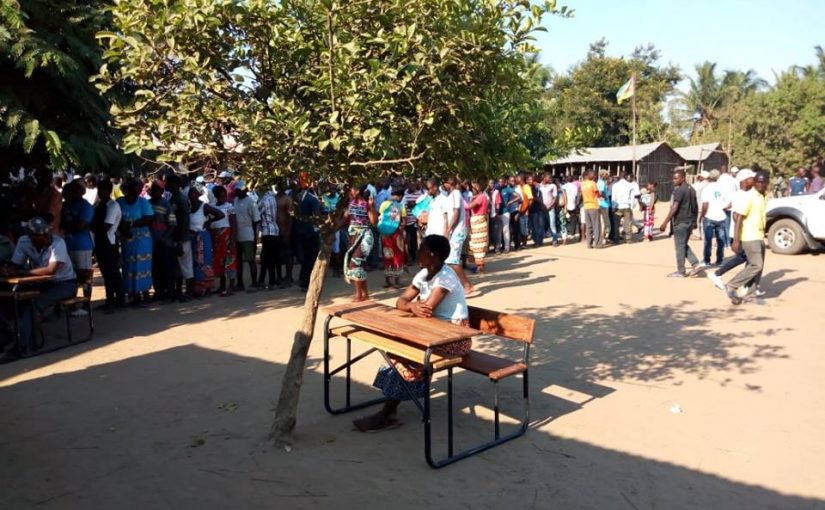South Africa's firebrand MP banned from entering UK
FRELIMO will not govern in Marromeu, says RENAMO

In file CoM
The main Mozambican opposition party, the former rebel movement Renamo, on Friday warned that the ruling Frelimo Party will not be able to govern in the municipality of Marromeu in the central province of Sofala.
Renamo spokesperson Jose Manteigas was speaking to reporters immediately after the Constitutional Council, the country’s highest body in matters of constitutional and electoral law, had proclaimed and validated the results of the rerun of the Marromeu election in eight polling stations on 22 November.
Manteigas did not explain how Renamo plans to make Marromeu ungovernable. “In due time, Mozambicans will know why and how it will not be possible to govern in Marromeu. We don’t accept the results”, he said.
Manteigas thought it paradoxical that the Council had validated the election, even though it recognised that serious irregularities had taken place. “Knowing that irregularities happened that were even more serious than in the first round, the Constitutional Council validated the election”, he said. “It recognised all the behaviour that endangered the process, and so it is beyond belief that the Council has said that Renamo lost”.
The arithmetic is not favourable to Frelimo. Although the gross illegalities in Marromeu gave Frelimo a slight majority of votes, this was not enough to provide it with a majority of seats on the incoming municipal assembly. Frelimo will have eight seats, Renamo eight and the Mozambique Democratic Movement (MDM) one. So if the two opposition parties vote together, Frelimo will not be able to get anything through the Assembly.
The municipal elections were held on 10 October in all 53 Mozambican municipalities and on 14 November the Constitutional Council validated the results in 52 municipalities – but it threw out the Marromeu result because of “serious irregularities which called into question the freedom, justice and transparency of the elections” at eight polling stations.
But the rerun election, on 22 November, was marred by the same illegal behaviour by polling station staff (MMVs) and police. When it became clear that Renamo had won by a substantial margin, the MMVs illegally expelled accredited journalists and observers from the polling stations.
The police removed the ballot papers and other election materials, and, again in clear violation of the law, results sheets were not posted at the stations, and copies of the results sheets were not given to political party monitors, observers or journalists.
But the police and MMVs were too late: by the time the observers were thrown out they had already taken note of the real results.
Despite this, the Council validated the result – although it accepted some of the damning criticisms of the rerun election made by observers and journalists. It mentioned in particular the fact that the outgoing chairperson of the Marromeu municipal assembly had been accepted as the chairperson of one of the eight polling stations. “This is ethically to be condemned”, it said.
But it did not specifically mention the much more serious illegalities, such as the expulsion of duly accredited observers and journalists from the polling stations, and the concocting of fraudulent results sheets outside of the stations.
The Council added that the Public Prosecutor’s Office is looking into electoral offences that took place during the voting and the count – in which case it seems premature for the Council to validate the results.
The Council lamented unspecified irregularities repeatedly committed by electoral staff, declaring that “it is imperative and urgent that there be a change of attitude on the part of all the protagonists of the electoral processes in order to put an end to these dangerous tendencies, preventing their generalization.”
“These attitudes have long been the subject of criticism and vehement condemnation by this Constitutional Council”, citing one of its own rulings in 2005 which said that the “greatest seriousness lies in the fact that misconduct remain unpunished, without accountability and without penalty … transforming the law into a dead letter. Indeed, it implies that the violations are not as reprehensible as the penalties provided in the law suggest.”
Despite these strong words, the Council called for no specific measures against those who broke the law, and did not take the obvious remedy of recounting the votes cast on 22 November.
The Council noted that Renamo said it possessed the “real results”, and when it asked for them they turned out to be the same as the results announced by the “Votar Mocambique” election observation group, which seemed to surprise the Council.
The Council seems never to have observed a count at a polling station. The procedure is that each ballot paper is taken out of the box and read aloud to everyone present. That is how the observers (and monitors from Renamo and other parties) knew the results before the police seized the electoral material and took it all away to concoct results sheets somewhere else, away from the prying eyes of observers and journalists.
Only one of the judges on the Council, Manuel Franque, who was appointed by the Renamo parliamentary group, denounced the obvious illegalities, while the other five voted to validate the results.
“Faced with so many irregularities, witnessed by 68 observers and 20 journalists, the current electoral system has once again shown that it can be manipulated by those who are in command of it, presenting the results which they find convenient”, said Franque.
Franque said the principle of “prior objection” remains “complex, unfeasible and unjust”, and the immediate result is “the whitewashing of irregularities that occurred in the elections”.
This principle means that a party or candidate cannot protest at any electoral fraud, unless it has first made a “prior objection” at the lowest possible electoral body, normally the polling station. But repeatedly polling station chairpersons have illegally refused to accept complaints from Renamo.
Franque noted that this refusal “with the intention of damaging some candidates and favouring others”, alongside the refusal to hand over copies of the results sheets, had, in Marromeu, “become a new way of obtaining election results outside of the legal framework”.
Franque was also concerned that it was not obligatory to notify party agents of the “intermediate count” (at municipal or district level). This meant that the tabulation of votes at this level could be done in the absence of opposition agents, making it difficult for them to protest.
Franque’s favoured solution is electronic voting – but there is no way that this can be introduced in Mozambique in the near future.
The Marromeu results approved by the National Elections Commisison (CNE) and now validated by the Constitutional Council were:
Number of votes cast: 19,559
Number of valid votes: 18,338
Frelimo: 8,395 (45.78 per cent)
Renamo: 8,349 (45.53 per cent)
MDM: 1,594 (8.69 per cent)
This Frelimo victory is entirely due to the results sheets from the stations where the election was re-run on 22 November. Without those results sheets, Renamo would have had a clear victory.












Leave a Reply
Be the First to Comment!
You must be logged in to post a comment.
You must be logged in to post a comment.